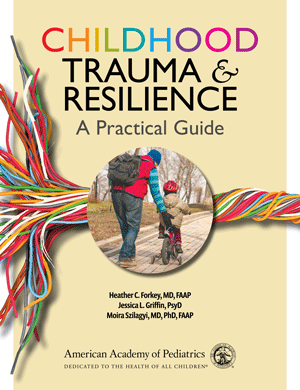Heather Forkey and Jessica Griffin co-author Childhood Trauma and Resilience
American Academy of Pediatrics publishes guidebook by UMass Medical School child trauma experts
The American Academy of Pediatrics has published Childhood Trauma & Resilience: A Practical Guide, written by UMass Medical School child trauma and treatment experts Heather Forkey, MD, and Jessica Griffin, PsyD, along with co-author Moira Szilagyi, MD, PhD, president-elect of the AAP.

collaboration focused on addressing
the impact of child abuse and trauma,
raising awareness of the impact of trauma, and promoting healing through
evidence-based approaches.
The new resource for clinicians and caregivers provides guidance on trauma-informed care and the protective power of resilience. It details the ways that adverse childhood experiences (ACEs), toxic stress and trauma can negatively impact brain development, and how that harm can be mitigated through healthy, positive relationships with caregivers and community support.
“Through our research and our work with patients, we have come to understand not only the importance of trauma-informed care, but to embrace the idea of resilience-informed care,” said Dr. Forkey, professor of pediatrics, chief of the Division of Child Protection, and director of the Child Protection Program and Foster Children Evaluation Services at UMass Memorial Children’s Medical Center. “Resilience skills and attachment are what keep children from experiencing long-term consequences from trauma, and there’s never been a more critical time to help families build this protective skill.”
Childhood Trauma & Resilience is a product of more than 15 years of collaborative work between the authors that has focused on addressing the impact of child abuse and trauma, raising awareness of the impact of trauma, and promoting healing through evidence-based approaches.
“Our longtime collaboration has allowed us to translate the science of stress into weaving threads of resilience with practical therapeutic tools and science-grounded techniques that can be done even outside of a therapist's office,” said Dr. Griffin, associate professor of psychiatry and pediatrics and executive director of the UMMS Child Trauma Treatment Center. “At a time when we are acutely aware that anyone can experience trauma, it is especially exciting to have tools our children, families and medical teams can use to heal.”
The authors address parent struggles and trauma, suggesting a paradigm shift in which clinical providers who care for children should treat the whole family. They also speak to the pressing issues of burnout and secondary traumatic stress amongst clinicians, emphasizing that trauma-informed care is best done in a team setting with support from colleagues.
“It is about applying empathy and engagement, connecting and collaborating, and meeting the reality of our patients’ lives,” said Forkey. “Humans address stress and consequent morbidities best by turning to each other for support.”
Forkey, a pediatrician, and Griffin, a clinical psychologist, are nationally recognized experts in treating childhood trauma and advocates for child- and family-centered trauma-informed care. Dr. Szilagyi, the Peter Shapiro Term Chair for Enhancing Children’s Developmental and Behavioral Health in Pediatrics, professor of pediatrics, and division chief of developmental-behavioral pediatrics at University of California Los Angeles, is 2021 president-elect and 2022 president of the American Academy of Pediatrics.
The Foster Child Evaluation Services clinic provides accessible and comprehensive health care for children in foster placement in a child-centered and trauma-informed way. The Child Trauma Training Center has provided evidence-based, trauma-informed care training to more than 38,000 health care and other professionals who work with at-risk kids and families across Massachusetts since 2012.